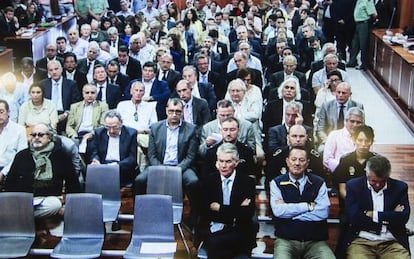Marbella property corruption mastermind Roca jailed for 11 years
Malaya case judgment comes for dozens of defendants eight years after judicial investigation was launched Prosecutor had asked for stiffer punishment

Juan Antonio Roca, the mastermind behind the sprawling web of real estate-linked corruption in Marbella, has been sentenced to 11 years in prison and fined 240 million euros after being found guilty on charges of money laundering, receiving bribes, fraud and other offenses. Prosecutors had asked the Málaga provincial court for a 30-year sentence to be handed down to the man who was put in charge of urban planning in Marbella under the town’s flamboyant and corrupt late mayor, Jesús Gil.
In the 5,000-page sentence, which the court released on Friday morning, 83 other defendants in the so-called Malaya corruption case have also received judgment. Among these, Pedro Román, the former right-hand man of Gil before the controversial politician’s death in 2004, was sentenced to four years’ imprisonment and fined 2.5 million euros.
Two former mayors who followed in Gil’s footsteps in Marbella town hall, Julián Muñoz and Marisol Yagüe, received respective sentences of two years in jail and a five-year ban from public office and six years’ imprisonment, plus a fine of more than two million euros. Despite the short sentence in the Malaya ruling, Muñoz will remain in jail for some time, however. Gil's successor in Marbella town hall has already been convicted of 52 offenses, and sentenced to 45 years in prison in relation to real estate crimes alone.
This has been a hard and unfair blow” Former Mayor Marisol Yagüe
In response to the sentence, part of which was read out over the course of more than 40 minutes by presiding Judge José Godino, Yagüe said: “This has been a hard and unfair blow.” A third of the charges Yagüe was convicted of relate to dealings with businessman Ismael Pérez Peña, who provided vehicles to the municipal government and who admitted paying Roca a bribe of 180,000 euros. Yagüe's lawyer said she would be appealing the sentence before the Supreme Court.
Montserrat Corulla, an adviser to Roca, received a jail term of four years and a fine of 30 million euros, while former councilor and ex-professional soccer player Tomás Reñones got four years and a fine of 300,000 euros.
Almost one third of the defendants were acquitted. One of those who had avoided being convicted said: “We have to break open the champagne.”
Roca was arrested on March 29, 2006, along with the then-Marbella Mayor Yagüe and a host of other town officials. In all, nearly 100 people were charged in the Malaya investigation, at the time Spain’s biggest corruption case. The probe began in late 2005.
“The court has reached the firm conviction of the reality of a generalized system of corruption that had been installed in Marbella City Hall on the part of those brought to trial under the power of Mr Roca,” the sentence read.
The sentence also speaks of the “absolute dereliction of duties of the councilors that were put on trial, bowing themselves to the shady dealings of Mr Roca.” It concludes that the building permits that were granted in exchange for bribes were authorized in prior meetings with the heads of the tripartite municipal government who received envelopes with money to be handed to other councilors.
The court has reached the firm conviction of the reality of a generalized system of corruption"
The court also rejected Roca’s argument that the sums obtained were meant to finance the parties that made up the government. The payments received “were not intended to finance a nonexistent electoral campaign, but simply to buy the will of politicians to guarantee administrative decisions in the interest of those who made the payments,” the sentence reads.
The sentence was based on secret accounts of the bribes paid on a computer in Roca’s office and the evidence of his accountant, Salvador Gardoqui. Proof of a corruption ring was also gathered through the tapping of telephone conversations between those involved.
Roca initially denied any wrongdoing but eventually confessed after the prosecutor reached an agreement with Pérez Peña, who admitted to bribing both Roca and Yagüe. The court took that confession into consideration in formulating its sentence against him. The prosecutor had also asked the court to fine Roca 810 million euros.
Roca had estimated that his empire of 71 ghost companies had a value of €210 million.
Tu suscripción se está usando en otro dispositivo
¿Quieres añadir otro usuario a tu suscripción?
Si continúas leyendo en este dispositivo, no se podrá leer en el otro.
FlechaTu suscripción se está usando en otro dispositivo y solo puedes acceder a EL PAÍS desde un dispositivo a la vez.
Si quieres compartir tu cuenta, cambia tu suscripción a la modalidad Premium, así podrás añadir otro usuario. Cada uno accederá con su propia cuenta de email, lo que os permitirá personalizar vuestra experiencia en EL PAÍS.
¿Tienes una suscripción de empresa? Accede aquí para contratar más cuentas.
En el caso de no saber quién está usando tu cuenta, te recomendamos cambiar tu contraseña aquí.
Si decides continuar compartiendo tu cuenta, este mensaje se mostrará en tu dispositivo y en el de la otra persona que está usando tu cuenta de forma indefinida, afectando a tu experiencia de lectura. Puedes consultar aquí los términos y condiciones de la suscripción digital.








































